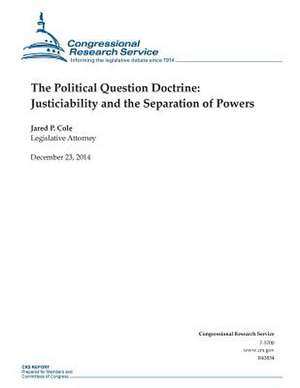The Political Question Doctrine
Autor Congressional Research Serviceen Limba Engleză Paperback
Preț: 122.43 lei
Nou
Puncte Express: 184
Preț estimativ în valută:
23.43€ • 24.15$ • 19.78£
23.43€ • 24.15$ • 19.78£
Carte disponibilă
Livrare economică 10-24 februarie
Preluare comenzi: 021 569.72.76
Specificații
ISBN-13: 9781505876994
ISBN-10: 1505876990
Pagini: 28
Dimensiuni: 216 x 279 x 2 mm
Greutate: 0.09 kg
Editura: CREATESPACE
ISBN-10: 1505876990
Pagini: 28
Dimensiuni: 216 x 279 x 2 mm
Greutate: 0.09 kg
Editura: CREATESPACE
